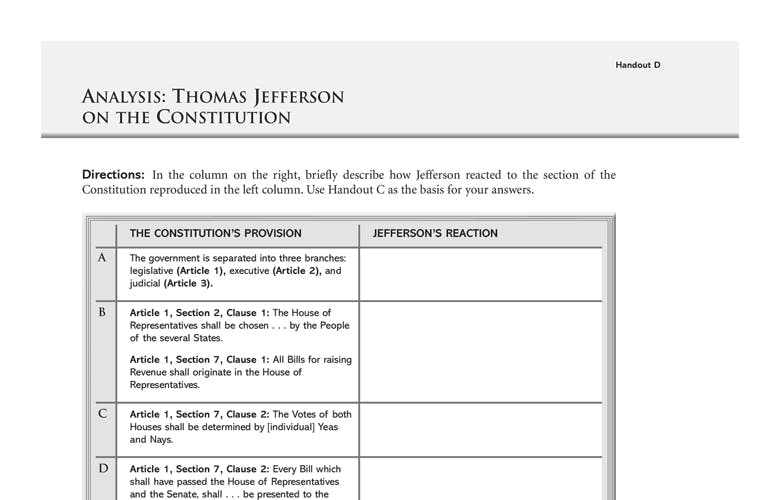Handout D: Analysis: Thomas Jefferson on the Constitution
Directions: In the column on the right, briefly describe how Jefferson reacted to the section of the Constitution reproduced in the left column. Use Handout C as the basis for your answers.
| THE CONSTITUTION’S PROVISION | JEFFERSON’S REACTION | |
|---|---|---|
| A | The government is separated into three branches: legislative (Article 1), executive (Article 2), and judicial (Article 3). | |
| B | Article 1, Section 2, Clause 1: The House of Representatives shall be chosen . . . by the People of the several States.
Article 1, Section 7, Clause 1: All Bills for raising Revenue shall originate in the House of Representatives. |
|
| C | Article 1, Section 7, Clause 2: The Votes of both Houses shall be determined by [individual] Yeas and Nays. | |
| D | Article 1, Section 7, Clause 2: Every Bill which shall have passed the House of Representatives and the Senate, shall . . . be presented to the President of the United States; If he approve he shall sign it, but if not he shall return it, with his Objections to that House in which it shall have originated, who shall . . . proceed to reconsider it. If after such Reconsideration two thirds of that House shall agree to pass the Bill, it shall be sent . . . to the other House, . . . and if approved by two thirds of that House, it shall become a Law. | |
| E | Article 1, Section 9, Clause 2: The Privilege of the Writ of Habeas Corpus shall not be suspended, unless when in Cases of Rebellion or Invasion the public Safety may require it. | |
| F | Article 3, Section 2, Clause 3: The Trial of all Crimes, except in Cases of Impeachment, shall be by Jury | |
| G | Article 1, Section 8, Clauses 12 & 14: [The Congress shall have Power] To raise and support Armies, but no Appropriation of Money to that Use shall be for a longer Term than two Years…. [and] To make Rules for the Government and Regulation of the land and naval Forces. | |
| H | Article 2, Section 1, Clause 1: [The President] shall hold his Office during the Term of four years. |
